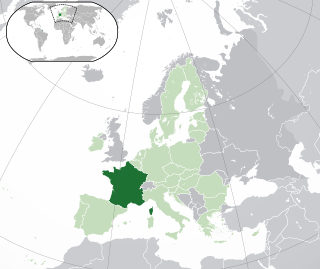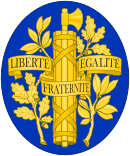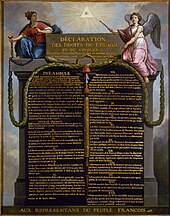Human rights in South Korea are codified in the Constitution of the Republic of Korea, which compiles the legal rights of its citizens. These rights are protected by the Constitution and include amendments and national referendum. These rights have evolved significantly from the days of military dictatorship to the current state as a constitutional democracy with free and fair elections for the presidency and the members of the National Assembly.

Bulgaria joined the Council of Europe and ratified the European Convention on Human Rights in 1992 and joined the European Union in 2007. Despite this, Bulgarian compliance with human rights norms falls below the standard expected of an ECHR signatory. The European Court of Human Rights noted that of 596 applications dealt with by the Court in 2022, 25 resulted in a judgement finding at least one human rights violation.
Human rights in Germany enjoy a high level of protection, both in theory and in practice, and are enshrined in the Grundgesetz. The country has ratified most international human rights treaties. Reports from independent organizations such as Amnesty International certify a high level of compliance with human rights, while others, like the researcher Tobias Singelnstein, point out several issues, in particular police brutality and mistreatment of refugees. The 2008 Freedom in the World report by US-funded Freedom House gives Germany a score of "1" for both political rights and civil liberties.
Current issues concerning human rights in Albania include domestic violence, isolated cases of torture, and police brutality, the general condition of prisons, human and sex trafficking and LGBT rights.

The Declaration of Montreal on Lesbian, Gay, Bisexual, and Transgender Human Rights is a document adopted in Montreal, Quebec, Canada, on July 29, 2006, by the International Conference on LGBT Human Rights which formed part of the first World Outgames. The Declaration outlines a number of rights and freedoms pertaining to LGBT and intersex people that it is proposed be universally guaranteed. It encompasses all aspects of human rights, from the guarantee of fundamental freedoms to the prevention of discrimination against LGBT people in healthcare, education and immigration. The Declaration also addresses various issues that impinge on the global promotion of LGBT rights and intersex human rights. Intended as a starting point in listing the demands of the international LGBT movement, it will ultimately be submitted to the United Nations.

Prostitution in France was legal until April 2016, but several surrounding activities were illegal, like operating a brothel, living off the avails (pimping), and paying for sex with someone under the age of 18.
Human rights in Cyprus are protected by the constitution of the Republic of Cyprus.

Angola has long been severely criticized for its human rights record. A 2012 report by the U.S. Department of State said, "The three most important human rights abuses [in 2012] were official corruption and impunity; limits on the freedoms of assembly, association, speech, and press; and cruel and excessive punishment, including reported cases of torture and beatings as well as unlawful killings by police and other security personnel. Other human rights abuses included: harsh and potentially life-threatening prison conditions; arbitrary arrest and detention; lengthy pretrial detention; impunity for human rights abusers; lack of judicial process and judicial inefficiency; infringements on citizens' privacy rights and forced evictions without compensation; restrictions on nongovernmental organizations; discrimination and violence against women; abuse of children; trafficking in persons; discrimination against persons with disabilities, indigenous people, and persons with HIV/AIDS; limits on workers' rights; and forced labor." In 2022, Freedom House rated Angola "not free".

According to the Republic of Niger's Constitution of 1999, most human rights, as defined by the Universal Declaration of Human Rights, are upheld and protected. Despite these protections, concerns of both domestic and international human rights organizations have been raised over the behavior of the government, military, police forces, and over the continuation of traditional practices which contravene the 1999 constitution. Under French colonial rule (1900–1960) and from independence until 1992, citizens of Niger had few political rights, and lived under arbitrary government power. Although the situation has improved since the return to civilian rule, criticisms remain over the state of human rights in the country.

Human rights in Austria are generally respected by the government; however, there were problems in some areas. There were some reports of police abuse and use of unjustified force against prisoners. Antisemitic incidents, including physical attacks, name-calling, property damage, and threatening letters, telephone calls, and Internet postings occurred during the year. There was some governmental and societal discrimination against fathers, Muslims and members of unrecognized religious groups, particularly those considered "sects". There were incidents of neo-Nazi activity, rightwing extremism, and xenophobia. Trafficking in women and children for prostitution and labor also remained a problem.

Concerns about human rights in Chile include discrimination against indigenous populations; societal violence and discrimination against women, children, and lesbian, gay, bisexual, and transgender (LGBT) people; child labor; and harsh prison conditions and treatment. Additional human rights concerns in the country include use of excessive force and abuse by security forces, isolated reports of government corruption, and anti-Semitism. Authorities generally maintain effective control over the security forces. However, security forces occasionally commit human rights abuses. The government generally takes steps to prosecute officials who commit abuses. Nevertheless, many human rights organizations contend that security officials accused of committing abuses have impunity.
Romani people in France, generally known in spoken French as gitans, tsiganes or manouches, are an ethnic group that originated in Northern India. The exact number of Romani people in France is unknown; estimates vary from 500,000 to 1,200,000.
The history of human rights in Argentina is affected by the Dirty War and its aftermath. The Dirty War, a civic-military dictatorship comprising state-sponsored violence against Argentine citizenry from roughly 1976 to 1983, carried out primarily by Jorge Rafael Videla's military government. However, the human rights situation in Argentina has improved since.

Racism has been called a serious social issue in French society by some commentators despite public belief that racism does not exist on a serious scale in France. Antisemitism, as well as prejudice against ethnic Muslims and other non-Christians, have a long history. Acts have been reported against members of resident minority groups including Jews, Berbers, Arabs and Asian people. 2019 police data indicates a total of 1,142 acts classified as "racist" without a religious connotation. Some racist acts have a religious connotation: the same data indicates 1,052 anti-Christian, 687 anti-Jewish and 154 anti-Muslim acts were perpetrated in 2019 for a total population of over 67 million. Although France's Muslim population far exceeds its Jewish population according to private studies, antisemitic acts far outnumbered Islamophobic acts in 2019 according to official government statistics.
The deportation of Roma migrants from France was subject of intense political debate in France and internationally in 2009 and 2010. After two fatal incidents, President of France Nicolas Sarkozy vowed in July 2010 to evict at least half of the 539 Roma squatted land camps. The Government of France initiated a program to repatriate thousands of Romanian and Bulgarian Roma, as part of the crackdown. Between July and September 2010, at least 51 Roma camps were demolished, and France has repatriated at least 1,230 Roma to Romania and Bulgaria.

According to international observers, human rights in Belgium are generally respected and the law and the judiciary provides effective means of addressing individual instances of abuse. However, some concerns have been reported by international human rights officials over the treatment of asylum seekers, prison overcrowding and the banning of full face veils. Capital punishment in Belgium is fully abolished and a prohibition on the death penalty is included in the Constitution of Belgium. Belgium was a founding member of the European Union and the Council of Europe and a signatory to the European Convention on Human Rights. Belgium has minimal issues regarding corruption and was ranked 15 out of 167 countries surveyed in Transparency International's 2015 Corruption Perceptions Index.
Human rights in Northern Cyprus are protected by the constitution of Northern Cyprus. However, there have been reports of violations of the human rights of minorities, democratic freedom, freedom from discrimination, freedom from torture, freedom of movement, freedom of religion, freedom of speech, right to education, right to life, right to property, and the rights of displaced persons. The rights of Greek Cypriots displaced by the 1974 Turkish invasion of Cyprus, notably their rights to property and right of return, is one of the focal points of ongoing negotiations for the solution of the Cyprus question.
Bodily integrity is the inviolability of the physical body and emphasizes the importance of personal autonomy, self-ownership, and self-determination of human beings over their own bodies. In the field of human rights, violation of the bodily integrity of another is regarded as an unethical infringement, intrusive, and possibly criminal.

Intersex people in France face significant gaps in protection from non-consensual medical interventions and protection from discrimination. The birth of Abel Barbin, a nineteenth-century intersex woman, is marked in Intersex Day of Remembrance. Barbin may have been the first intersex person to write a memoir, later published by Michel Foucault.

Portugal is generally considered as successful in upholding the civil liberties and protecting the human rights of its citizens. Portugal has proved to be determined in promoting and respecting human rights at an international and national level. The country's minister of Justice as of September 2018, Francisca Van Dunem, said that Portugal has had "a good track record" on human rights but violations still do persist.














